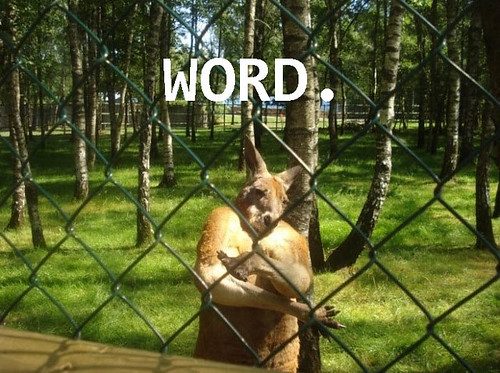“Let me be clear; this is going to suck.”
Those are usually the first words out of the mouth of today’s interviewee, Tate Linden, the latest in our series on the art of naming, when he discusses what working with his firm is like. He’s been heading up Stokefire, a strategic branding and advertising firm in Old Town Alexandria, Virginia, since 2005. All things considered, he seems to be doing pretty well.
In an industry where fun times, team building, and corporate retreats are the norm, Linden’s approach to developing names and brands tends to raise eyebrows and voices. With an education in philosophy and classical music performance from UCLA and a background in Fortune 500 product management, you might think he’d be mild mannered.
He is not.
He’s constantly poking, prodding, and provoking. A quick scan of his @Thingnamer twitter feed or Stokefire’s blog makes this abundantly clear. He’s not afraid to stir things up or to call into question the very foundation of the industry in which he makes his living.
His Twitter bio reads, “I brand stuff. With… My… MIND.” But we’re hoping he’s not quite so succinct in our interview.
How did you get started in the naming business?
The official version of the story has me figuring out how to brand stuff while employed for a decade by various Fortune 500 firms, and then parting ways to start up my own firm to specialize in it. Unofficially, the things that made me great at branding also made me intolerable as an employee of a conglomerate.
Around 2002 I left and began freelancing, then started up Stokefire in 2005 to focus almost exclusively on the verbal aspects of branding. Today we’re no longer a pure naming agency, but we do take on projects that have naming as one component of the larger brand.
What types of customers and clients do you work with?
Early on a pulse and a bank account were the only qualifiers, and the pulse was just a ‘nice-to-have.’ Now we have a bit more leeway to engage in projects that present the most interesting and unique challenges.
I look for great organizations that may be struggling to better connect with or have an impact on their audiences. We’ve worked with organizations like Google, Motorola, Charles Schwab, Heinz, and the largest caucus of the United States Congress. A couple of the most intriguing projects we’ve taken on have been the branding and advertising of concrete in North America, and a complete overhaul of the US Department of Defense’s DARPA brand.
Oh. And there’s also a living online dictionary whose leader called us a few years ago and asked us to help her team figure out a name. The result of that project was something your readers may know: Wordnik.
How would you describe your naming process?
Pretty easily. “Painful” or “cathartic” both fit well. And I’m not stretching the truth. We put an immense amount of pressure on the name and the people and products that will be defined by it. We do this in order to ensure everything works effectively together and will stand up to the potential real world pressures to come. In my view a fun naming process is one that is likely to result in a name that serves a client well only until something goes wrong. As Mike Tyson said, “Everybody has a plan until they get punched in the face.” A client is better served by experiencing those blows in private and learning to respond to them than they are by the experience of being TKO’d in public.
Process? We’ve got all sorts of proprietary tools, worksheets, and tables, but so does every branding and naming pro out there. Our stages are roughly in line with what you’d see anywhere else. It’s the guiding philosophies and the way that we apply them to what we do that makes us different and potentially more effective.
As for those philosophies, the one I reference most frequently is based on a quote attributed to Gandhi. He said, “Happiness is when what you think, what you say, and what you do are in harmony.” Ultimately Gandhi’s concept of happiness is the framework for all of the brands we craft. It’s not about slathering on a new coat of paint that will begin flake off the moment our team leaves. We strip organizations to the bare wood and help them display what makes them genuinely strong. When we leave there’s no questions from panicked leaders asking how to respond to something because what we’ve left them with is who they genuinely are rather than what Stokefire or their target audience wants them to be.
What are some resources that you use?
When naming, the books I pull down more than any others are my crossword dictionaries. They present words as answers to the questions a strategist might ask rather than as definitions we might not know to look for. Strangely, I’ve not migrated to the web for this resource, though I’m sure there’s something equivalent available.
When I do go online I have a few sites that draw me back time and again. There are some good reverse-lookup dictionaries, and there’s Wordnik’s ability to show how a term is currently being used, and to link to various kinds of related concepts. It’s a site I hit consistently with every project.
My best resource, though, is the network of creative professionals I’ve had the good fortune to work with over the years. Knowing that I can turn to someone like copywriter and naming pro Nancy Friedman when I need perspective or have a project that isn’t in my specialty area is invaluable. Back in the day I even relied on Wordnik’s own Erin McKean to share her lexicographical chops and entice a client to take the right path.
Living resources trump static resources almost every time, and you don’t get much more living than a person. Well, unless they’re dead.
What are some mistakes you’ve seen companies make in terms of naming?
Contrary to what I read in blog chatter and in the news, I think risk avoidance causes more problems than anything else. The number of brands that fail for lack of risk far exceeds the occasional Icarus-like ones that fail for too much of it.
The next time someone tells you that they can’t accept a name with risk, consider asking them if pouring money into a brand that no one notices and no one cares about is more or less risky than investing in one that just might have a shot.
What are some trends you’d sooner see die off?
All of them.
Back in early 2007 I spent about a week analyzing the impact of naming trends on the success of organizations. At that time the trends mostly involved prefixes like the e in eBusiness and the then revolutionary concept of personalization through the use of I, My, or You, as in iPod or YouTube.
My findings suggested that names that followed trends had only a 4% chance of being attached to a successful organization while those that avoided any identifiable trend had a success rate more than 250% higher. I knew copycat naming was a bad idea on principle, but I’d had no idea it was so strongly linked to organizational success.
I’m not suggesting that the trends themselves are causing companies to fail. I think that any organizational leadership that believes following a naming trend would be more effective than discovering a genuine way to express itself has larger problems. A copycat name is like a warning beacon to clients and investors that the organizational leadership views their product as a commodity, takes shortcuts, lacks strategic vision, and isn’t comfortable in their own skin.
Other than that, though, it’s no big deal.
Any last words?
Just that I’m honored to be included with the likes of Nancy Friedman, Anthony Shore, and the : : CRONAN : : crew; a talented group by any measure.
Also. It was mostly pain free. So, thanks Wordnik!
After our interview but before publication we learned that Michael Cronan passed away and reached out to Tate for comment.
I met Michael very briefly around 2006 and recall being awed by how his work and thinking consistently avoided trends, and even started them on more than one occasion. His passing this New Year’s Day was a blow to the identity industry, and indescribably difficult for the friends, family and peers that battled cancer alongside him for the past five years.
If Gandhi was right and happiness truly is “when what you think, what you say, and what you do are in harmony,” then from my vantage point, even considering his more recent health battle, Michael looks to have led a wonderfully happy life.
To my way of thinking there’s no higher praise a man can earn.




